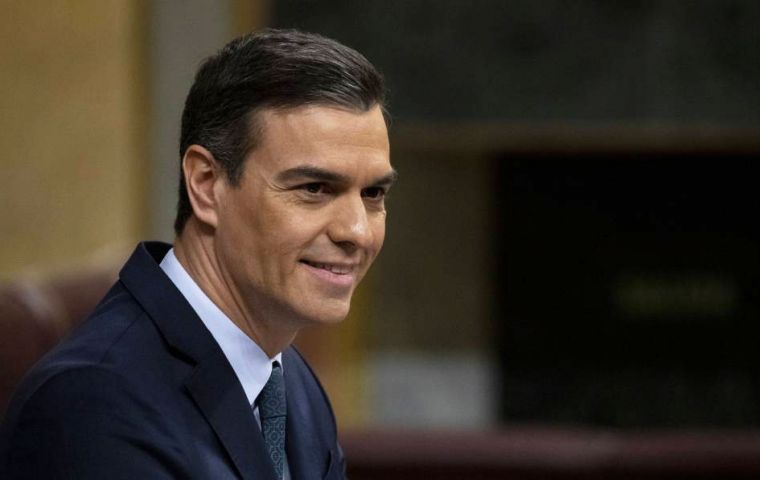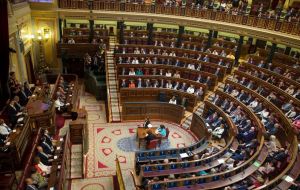MercoPress. South Atlantic News Agency
Spain finally has a government: a coalition which includes a Catalan separatist group
 Socialist leader Pedro Sanchez, 47, had 167 lawmakers backing him and 165 against, to win a decisive second round of voting
Socialist leader Pedro Sanchez, 47, had 167 lawmakers backing him and 165 against, to win a decisive second round of voting  The slim victory was facilitated by 18 abstentions, including 13 from the pro-independence Esquerra Republicana de Catalunya party
The slim victory was facilitated by 18 abstentions, including 13 from the pro-independence Esquerra Republicana de Catalunya party  “Spaniards did their duty by voting not once but five times in a year and our obligation is to give them what they have voted for: a government” Sanchez said
“Spaniards did their duty by voting not once but five times in a year and our obligation is to give them what they have voted for: a government” Sanchez said Socialist leader Pedro Sanchez won the narrowest of victories in Parliament on Tuesday to take power for a second term in Spain with the backing of the anti-austerity party Podemos and a Catalan separatist group.
Mr. Sanchez, 47, had 167 lawmakers backing him and 165 against, to win a decisive second round of voting. He fell short of the absolute majority he needed in the first ballot held on Sunday.
That slim victory, facilitated by 18 abstentions, including 13 from the pro-independence Esquerra Republicana de Catalunya party, underscores the difficulty he'll face to pass the litany of legislation his coalition has promised their voters.
“Spaniards did their duty by voting not once but five times in a year and our obligation is to give them what they have voted for: a government,” Mr. Sanchez said in a speech to Parliament on Tuesday.
The result gives Mr. Sanchez a mandate to reverse some of the policies that helped Spain emerge from an economic crisis six years ago.
He plans to fund more social spending with higher taxes on large companies and wealthier Spaniards and to bring in more protection for workers and a higher minimum wage in the country's first coalition government since before the 1936-1939 Civil War.
The minority government's first major task will be to make up for lost time and pass the 2020 budget, long overdue.
Spain has been in political stasis for nearly a year after voters elected divided parliament in April - Spaniards have also voted in local, regional and European elections in the meantime.
The prospect of power sharing with Podemos has concerned some investors. The party led by Mr. Pablo Iglesias has pushed for higher taxes on banks to recover some of the 60 billion Euros spent bailing them out during Europe's financial crisis.
It also wants to further regulate the real estate market, including introducing rent caps.
Mirroring a trend elsewhere in Europe, the political spectrum in Spain too has become increasingly splintered, making the formation of government more difficult.
The country held four elections in as many years. One of the most divisive forces in the country's political arena was the campaign by Catalan nationalists to force a break from the rest of Spain in 2017.




Top Comments
Disclaimer & comment rulesCommenting for this story is now closed.
If you have a Facebook account, become a fan and comment on our Facebook Page!